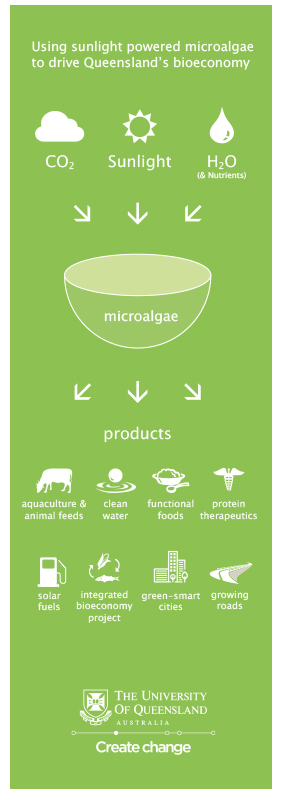One day, the fuel for your car, the medicine you take and even the food you eat could be produced by tiny green algae powered by sunlight.
IMB’s Professor Ben Hankamer and his team are working to fast-track development of renewable solar fuels and other products that are CO2-neutral and reduce competition for arable land and fresh water.
“By 2050, the human population is forecast to expand to 9 billion people, requiring 50 per cent more fuel, 70 per cent more food, and 50 per cent more fresh water,” Ben said.
“At the same time, Intergovernmental Panel on Climate Change data show that we must reduce CO2 emissions by ~80 per cent to limit the rise in average global temperature to two degrees Celsius, the limit agreed to at the 2015 UN Conference on Climate Change.
“Achieving this reduction necessitates the rapid development of clean fuel technologies, as about 80 per cent of our global energy demand is for fuels, but almost all renewable energy technologies—solar, wind, wave—generate electricity to supply the other 20 per cent.”
Ben’s team is focused on producing solar fuels from microalgae, which have evolved over 3 billion years to harness the huge energy resource of the Sun.
“Microalgae could help us transition from a finite fossil fuel resource to a sustainable solar energy supply,” Ben said.
Harnessing the Sun

The solar energy resource is so large that the sunlight striking the Earth’s surface in just two hours delivers enough energy to power the entire world economy for one year.
Plants and algae have mastered the art of harnessing this energy resource through evolving intricate systems that convert sunlight, CO2 and water into the food, fuel and atmospheric oxygen that support life on Earth.
“Compared to other crops, microalgae are highly efficient at converting sunlight and carbon dioxide into energy for their own growth—or for producing fuels, foods and other high-value products,” Ben said.
“My team is working to increase this efficiency further by improving production processes and genetically modifying algae cells.”
Microalgae can be grown in saline or waste water and agricultural run-off, and production systems can be located on non-arable land, reducing competition with food production and water resources.
Optimising algae
The big challenge Ben and his team are now addressing is to optimise these production systems to make solar fuels cost-competitive with fossil fuels.
“We are using advanced modelling to analyse technology and market needs to guide system design,” Ben said.
“We’re also studying microalgae cell lines to understand the photosynthetic machinery and increase the efficiency of sunlight conversion to biomass.
“Other researchers have demonstrated that the crude oil yield from microalgae can be increased, and there is plenty of potential for further optimisation.
“Our economies and our responses to climate change depend on stable fuel supplies, so it is economically and environmentally important to invest in and develop efficient renewable fuel systems now.”
Adding value
Microalgae have the potential to deliver much more than renewable fuels.
Microalgae biotechnologies can also power the production of high-value products such as vaccines, and animal and aquaculture feeds.
Ben and colleagues from across UQ are investigating the use of algae to produce components for dengue virus vaccines and new antibiotics.
“Having multiple markets for a range of algae products supports the refinement and cost reduction of microalgae systems, and ultimately helps to bring solar fuels closer to price parity with crude oil,” Ben said.
“Queensland is in an ideal position to take advantage of this technology, with its vast lands, abundant sunshine and saline water resources, a skilled workforce, excellent infrastructure and proximity to growing Asian markets.
“With the national focus on innovation for a strong economy, now is the time to invest in developments to secure our future fuel supply.”
Support our research
Queensland has the opportunity to play a global role in developing next-generation biotechnology solutions to meet growing demands for food, fuel and fresh water. But getting there will require more than just hard work and dedication, so we would be grateful for your support.
You are most welcome to contact Maureen O'Shea, Director of Advancement, on 07 3346 2185 or m.oshea@imb.uq.edu.au to discuss your interest and the various ways in which you can be involved in accelerating this vital research.
If you prefer to donate online, please follow the link below.
Donations of $2 or more are tax deductible in Australia.
Watch the UQ Global Leadership Series event Welcome to our Biofuture



